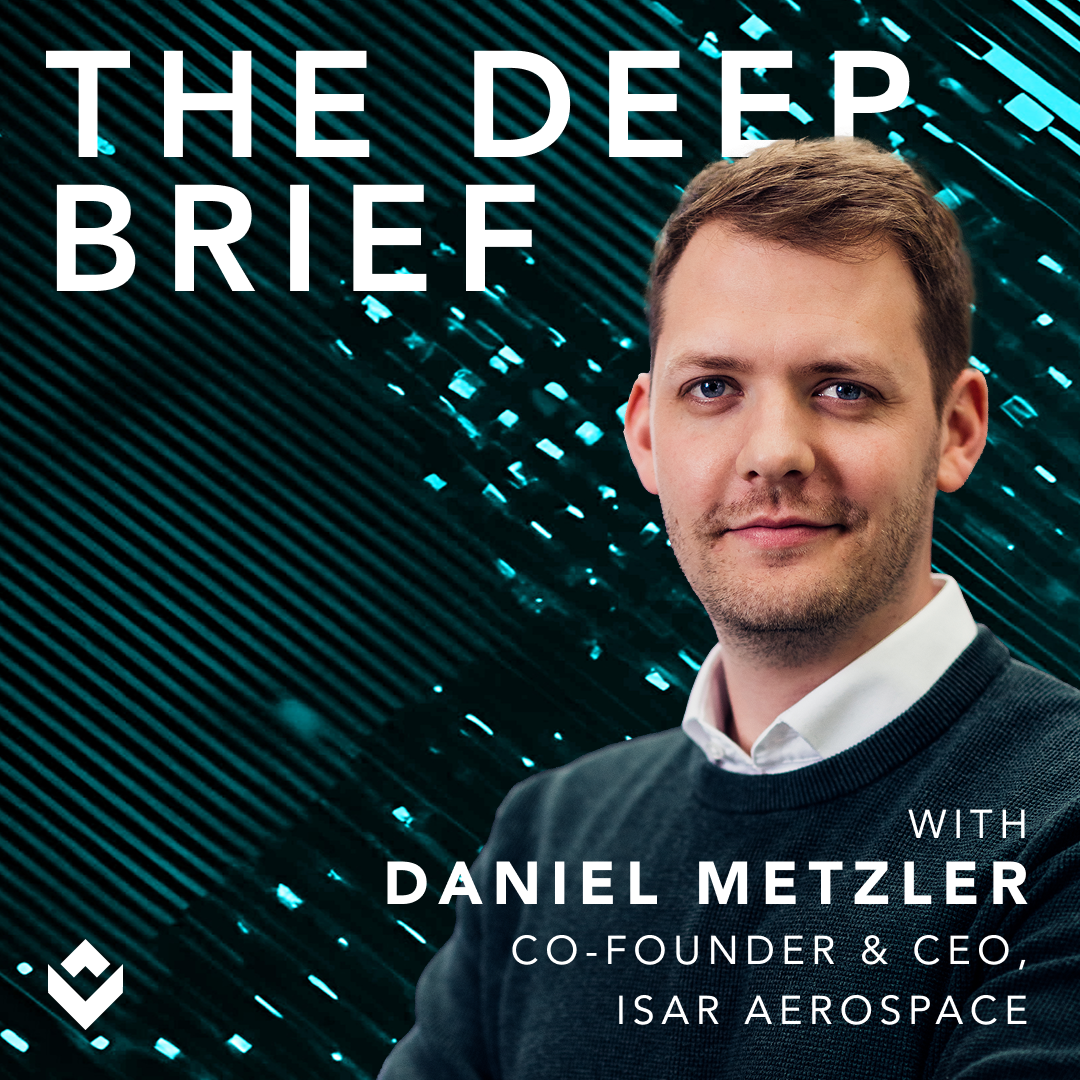THE DEEP BRIEF WITH DANIEL METZLER I ISAR AEROSPACE
 Daniel Metzler ist the CEO & Co-Founder of Isar Aerospace, Europe’s leading launch services provider
Daniel Metzler ist the CEO & Co-Founder of Isar Aerospace, Europe’s leading launch services provider
Building deep tech in Europe: what are your first thoughts when you think about the journey you have been on?
We have the talent, the resources, and the vision in Europe. While founding and growing Isar Aerospace and gaining more and more attention along the way, I was struck by how deeply invested people are in what we’re doing—there’s a real appetite for visionary thinking, for people who are willing and able to think ahead.
Does Europe have a deep tech capital problem – or a confidence problem?
The two are mutually dependent. There’s a confidence problem, in that the institutions and systems that could support young companies often don’t have the faith to invest and think big. At Isar Aerospace we are very lucky to have exactly those pioneering investors who are supporting us along the way and seeing the vast potential in the space industry. Europe needs to relearn how to be bold and ambitious. Otherwise, we risk becoming a region known for R&D, while other countries commercialize and profit from the technologies.
If Europe treated deep tech companies with the strategic importance they have for many areas—for example, defense—what would change overnight?
There is already a mindset shift happening in that direction. What’s challenging is that, just like in defense, you need long-term planning of production capabilities, and the same is true for deep tech. If we really want to build a world-class deep tech ecosystem, we have to plan ahead and commit to sustained investment and support over the long run. This commitment has to happen now. At Isar Aerospace, we ramped up development and production in parallel. This enabled us to complete our first test flight while simultaneously building up capacity for the near future.
What would you tell a long-term investor who’s still hesitant about backing deep tech in Europe?
Europe has a rich foundation of scientific excellence, exceptional talent, and a growing ecosystem of visionary entrepreneurs tackling some of the world’s biggest challenges. The European landscape is changing: there’s increasing support from governments, more cross-border collaboration, and a growing awareness of the strategic importance of deep tech. Investing now means shaping the industries and technologies that will define Europe’s—and the world’s—future and tackle some of the continent’s biggest challenges.
What’s a “hard truth” about building hardware startups that no one tells you?
Developing great technology is tough, but the real challenges come with turning your technology into a product and then a scalable business. At Isar Aerospace, we’ve focused on scalability from the start with a strong vertical integration and in-house development. The tight regulatory landscape in Europe and Germany slows down rapid industrialization. We need collaboration with national institutions if we want to build new growth sectors here.
What was your „this is impossible“ moment – and how did you push past it?
Building a rocket company in Europe from scratch with mostly private capital still feels impossible at times. But we learned to break down the big challenge into manageable steps—celebrating each milestone while keeping our long-term vision in mind. Moments like the first successful test of our in-house developed Aquila engine, or opening our own launch pad, which we built from the ground up, were major achievements. Finally seeing our rocket lift off for the first time this year was the ultimate reminder of what we can achieve.
What’s one piece of advice (or opinions) you ignored – and are glad you did?
At first, few believed we could compete with or catch up to the U.S. commercial companies that are years ahead. But the market quickly proved us right—demand for more launch capacity in Europe and the rest of the world was huge from the start. Even before it was obvious that relying on a single company or nation was risky, we trusted our own understanding of the market and focused on our vision.
What’s the one thing Europe gets right about space tech – something the rest of the world should copy?
Europe—especially Germany—has one of the strongest talent pools in space engineering and highly skilled technicians. Pioneering German engineers have always played a key role in space innovations: from Wernher von Braun’s team placing humans on the moon, to the Columbus laboratory on the ISS. Europe also excels at industrialization and automation. We should remember these strengths and keep building on them through innovation.
What’s the future of space tech that almost no one is talking about yet/ we talk about too little?
We talk a lot about space exploration and moon programs, but most of the space technology we need in the near future will be closer to Earth. That’s also where the biggest economic opportunities are right now. Low Earth orbit, our main focus, is expected to hold a billion-dollar market over the next decade.
How would you redesign Europe’s innovation ecosystem if you had a clean slate?
We need more long-term vision for Europe, “moonshot” programs backed by cross-border collaboration, strong unbureaucratic public funding through contracts and clear goals. At the same time, we have to foster a culture that embraces risk and allows for failure, encouraging serial entrepreneurship.